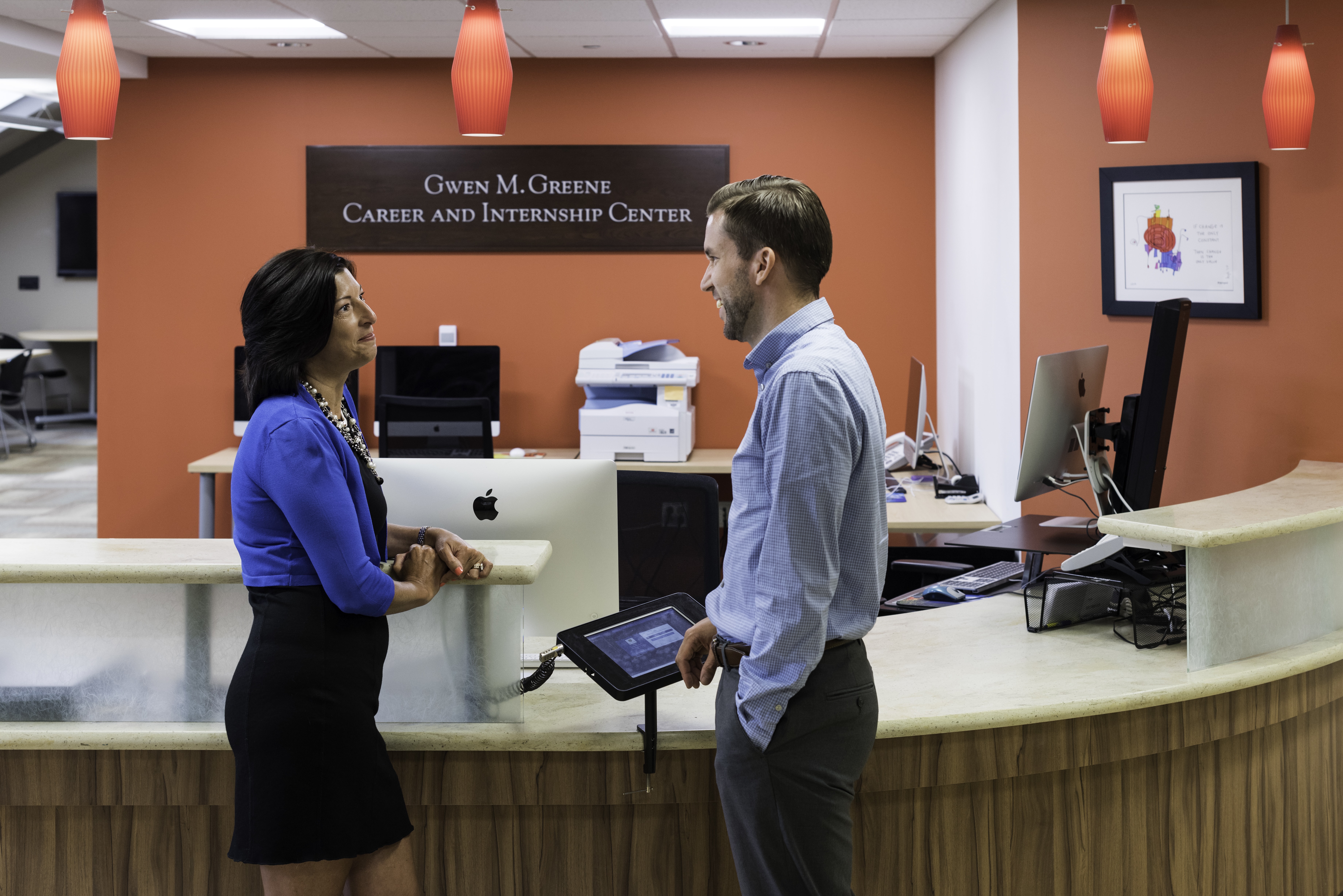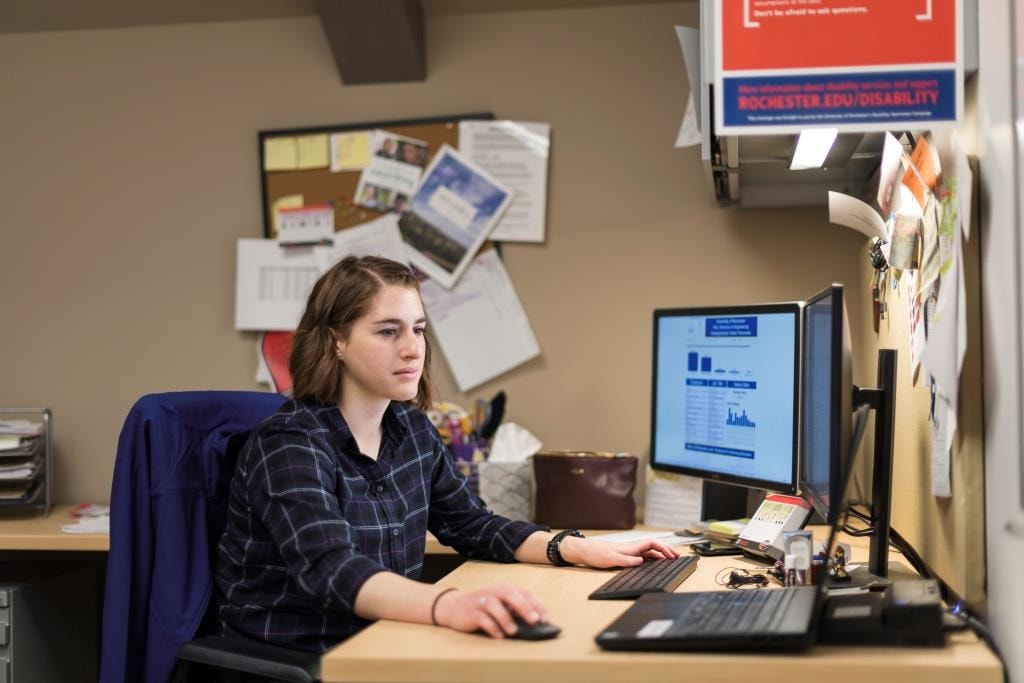by Sara Kowalski, Class of 2017, Humanities Fellow
Did you know Rochester students and alumni have access to first-class resources for career development? The hub of this is the Gwen M. Greene Career and Internship Center. Staff at the Greene Center see themselves as mentors. Students can make appointments with advisors who are equal parts “educators, connectors, and catalysts” and are passionate about giving students the knowledge and tools to prepare themselves for the rest of their professional lives.

Naturally, this applies equally to students of the humanities as it does to students of the natural and social sciences. However, many students might not realize that, so I am going to give a brief crash course in “How the humanities apply to career readiness.”
Career Competencies (AKA, what the National Association of College and Employers (NACE) have found you’ll need in the real world):
- Critical Thinking: Humanities students are AMAZING at this! They are taught to analyze everything, to constantly try new perspectives, to make connections, and to find their own way through projects and problems.
- Leadership: Humanities students at Rochester often rise to the top of their extracurricular organizations, councils, and clubs.
- Communication: Immersed in words and images throughout history and across the globe, humanities students are SPECTACULAR communicators! (Not to mention the enormous papers they’re constantly writing for their classes. And don’t even get me started on the presentations and today-you-teach class days!)
- Career Management: This means knowing yourself, your goals, and how to push yourself forward to reach them. At Rochester in particular, humanities students take charge of their own education and mold their undergraduate experience.
- Teamwork: Humanities students usually have the advantage of small, discussion-based classes, in which they collaborate with their peers, share ideas, and explore each other’s perspectives.
- Intercultural Fluency: Speaking of perspectives, humanities students are all about learning about different peoples and cultures throughout time, across the world, and in their own city and campus.
- Digital Technology: Modern technology is revolutionizing humanities research. And digital media is making leaps and bounds in how we communicate, how we make art, and how we connect to one another and made knowledge accessible.
- Professionalism & Work Ethic: In small departments, students and faculty get to know each other well. Students occupy the passionate, professional spaces of their department hall. When they make mistakes, they get personalized feedback from a trusted professor. In this way, they can learn about themselves and foster a strong sense of accountability and the ability for positive self-improvement.
The humanities make you agile and prepare you to design your future lives.
The most enduring misconception about the humanities is that they don’t help students in their professional lives. But in fact, they are invaluable to both career and personal development. (Naturally, that’s why Rochester requires students at least cluster in a humanity.)
What’s the point of college?
It’s easy to see where the misconception comes from. A liberal arts education is rarely strictly job training, but it can easily appear that way for non-humanities: students of science become scientists, students of engineering become engineers, students of business become businesspeople. Does a student of literature become Shakespeare? A student of Spanish a Spaniard? A student of anthropology a human? (Hopefully they were one already). The assumption about non-humanities students isn’t fair either (not all students majoring in a natural science ends up a “scientist”).
So what is the purpose of college, if not job training? In addition to giving young adults the chance to pursue their passions and learn things of interest to them, I’d propose that college (and particularly Rochester) prepares students to design their future lives. Your career/life is inevitably “non-linear” and full of chance occurrences. You can only do their best to prepare for it by pursuing one new opportunity after another, and being flexible when new opportunities and unexpected circumstances come along.
In other words, students at Rochester (and especially in the humanities) are prepared to make better decisions for themselves and to make plans, yes, but also respond in an agile way when even the best laid out plans change. As students develop career competencies, they will be ready for anything!
So how do you prepare for life after college? The Career Center has some advice:
- Know yourself.
- Discover your potential.
- Build career competencies.
- Create a personal brand.
- Establish a network.
Find your community.
The helpful advisers at the Career Center also recommend thinking hard about how you see yourself in one or more of their six ‘Career Communities,’ networks of like-minded people that seek to educate and connect with you about potential opportunities. Here are the six communities:
- Exploratory
- Arts, Entertainment, Communications, Marketing, and Media
- Consulting, Finance, Operations, and Sales
- Engineering, Technology, Data, and Physical Science
- Healthcare, Human Services, and Biomedical Research
- Law, Policy, and Social Good
Students may see themselves overlapping between communities, or incorporating two or more communities into their ideal career/life/future/present.
Humanities students can fit into ANY of these communities! (Yes, even the Engineering, Technology, Data, and Psychical Science one). Each of these communities are broken down into various professions which are well worth exploring!
When you identify a goal or two, perhaps a community in which you see yourself, then you can focus on preparing for it by taking certain courses, developing certain skills, participating in certain internships, and applying for certain jobs and fellowships.
Your “career” isn’t some distant future, pre-destined path you have to find and follow. It starts whenever you start and wherever you are. Why not start here and now?


